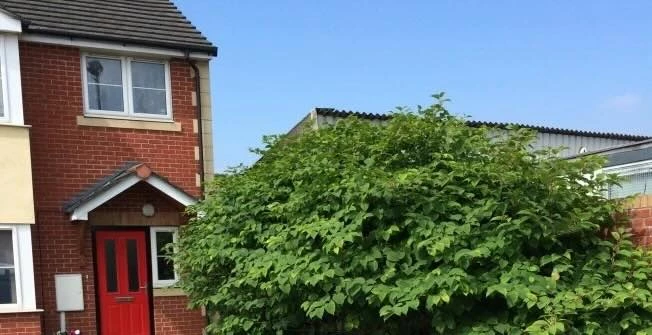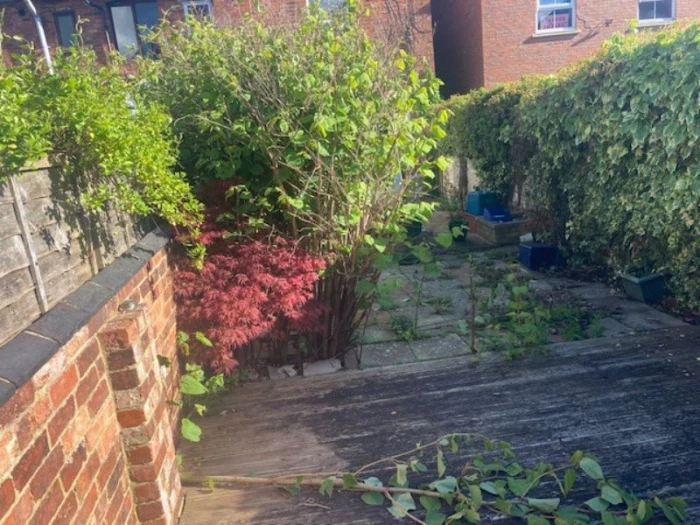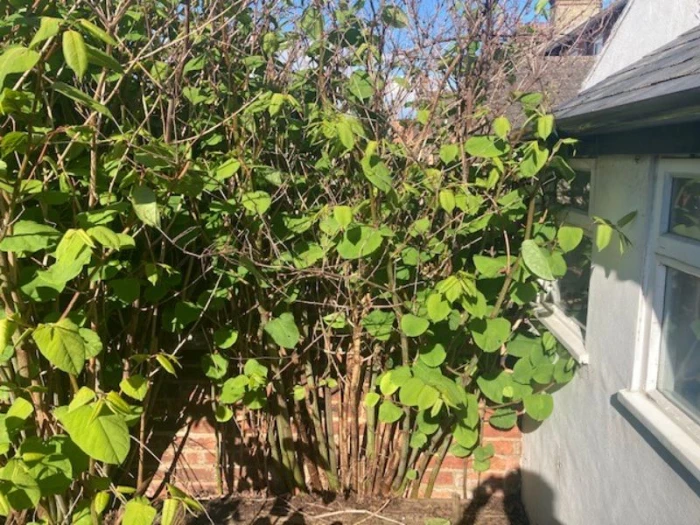
Japanese Knotweed Removal in West Hampstead
Get in touchJapanese knotweed is a highly invasive plant that can cause significant property damage.
Effective removal and control are essential to prevent further infestation and protect your landscape.
Our team of specialists in West Hampstead NW6 1 offers comprehensive solutions to manage and eradicate Japanese knotweed from your property.
Japanese Knotweed can be a real problem because it can grow through various materials, such as tarmac, concrete flags, block paving, and even walls.
Japanese Knotweed grows at a concerning rate in Spring and Summer and can grow up to 20cm per day.
We can eliminate Japanese Knotweed in West Hampstead by excavating the area and disposing of it at a licenced landfill.
Please get in touch for details on how to completely eradicate Japanese Knotweed.
Complete the contact form provided on this page or call the number above, and we will respond immediately.

Why Choose Professional Japanese Knotweed Removal?
Professional services manage infestations effectively.
Experienced specialists in West Hampstead inspect and identify knotweed growth to assess the extent of the infestation and plan the most effective removal strategy.Specialists remove knotweed thoroughly and safely.
Our team uses a combination of excavation, herbicide treatment, and manual removal to eradicate Japanese knotweed from your property, ensuring a comprehensive approach.Knotweed removal prevents further damage to property.
Proper control methods such as soil barriers and environmentally-friendly treatments are employed to ensure the prevention of regrowth and minimise the risk of future property damage caused by knotweed roots.
To fully understand the importance of professional removal services, it is crucial to recognise the threat that Japanese knotweed poses to properties, landscapes, and local environments.
Understanding this threat enables one to appreciate the necessity of targeted strategies for managing and eradicating this invasive species.
Understanding Japanese Knotweed and Its Impact
Japanese knotweed is an invasive species.
This persistent plant spreads rapidly, causing severe damage to buildings, gardens, and natural environments in West Hampstead. Its ability to grow through concrete, asphalt, and even building foundations can lead to extensive and costly repairs.Knotweed damages property by growing through concrete and walls.
The underground rhizome system of Japanese knotweed can penetrate hard surfaces, leading to structural damage. Roots grow aggressively, often unnoticed, until significant damage has already occurred.Environmental implications of knotweed spread are significant.
Japanese knotweed alters local ecosystems by outcompeting native plants and reducing biodiversity. Its spread affects both urban and rural landscapes, making comprehensive control measures essential for protecting local environments in West Hampstead.
How to Get Rid Of Japanese Knotweed In West Hampstead
Methods for Japanese Knotweed Removal in West Hampstead include: chemical treatment, excavation, and root barriers.
Chemical Treatment with Herbicides
Herbicides treat Japanese knotweed effectively.
Our licenced contractors apply specialised herbicides such as glyphosate that penetrate deep into the rhizome system to kill the plant at its source. This method is particularly effective for larger infestations where mechanical removal alone may not suffice.
Chemical treatment of Japanese Knotweed is a reliable removal method.
By using a targeted approach, herbicides break down the internal structure of the knotweed, providing a long-term solution to prevent regrowth. The application is done safely to minimise harm to surrounding plants and wildlife.
Manual and Excavation Techniques
Excavation is a thorough way to control knotweed growth.
For severe infestations, excavation removes both the plant and its extensive root network. This method involves digging up the contaminated soil and disposing of it in accordance with legal regulations to prevent further spread.
Manual removal of Japanese Knotweed complements chemical treatment.
Our team uses careful manual techniques to remove visible stems and roots, which can be combined with herbicide application for a comprehensive approach to eradication. Manual removal is particularly useful in sensitive areas where chemical use is restricted.
Soil Barrier Installation
Installing soil (root) barriers can help contain Japanese Knotweed spread.
Installing root barriers around the perimeter of an infested area prevents the further spread of knotweed roots into unaffected regions.
This physical barrier stops rhizomes from creeping into new zones, protecting adjacent properties and gardens.Japanese Knotweed Removal Cost in West Hampstead
How Much Does It Cost To Remove Japanese Knotweed?
The average cost to remove knotweed is £1,750 - £7,000.
A number of factors, including the number of weeds and the location, can alter the knotweed removal costs in West Hampstead NW6 1. Obviously, the amount of knotweed that needs to be removed will affect the cost.
The more knotweed you have, the more costly the removal will be. How far along the weeds have grown can also affect the cost.
If the weeds have been growing for a long time and have caused a lot of damage, killing the knotweed may be more expensive.
You should take into account the possibility of having to pay to repair the damage the knotweed caused to your property after you have paid for the removal of the weed.
To find out more about removal costs, please contact our team using the enquiry form presented on our page.
A member of staff will contact you as soon as possible with details on the prices involved and how we can remove the knotweed.
The Importance of Monitoring and Follow-Up
Regular monitoring ensures effective knotweed management.
After initial treatment, our specialists conduct periodic inspections to check for signs of regrowth. Ongoing monitoring allows for prompt follow-up actions if needed, ensuring the long-term success of the removal process.Prevention of regrowth saves time and costs.
By catching new growth early, we help avoid more extensive and expensive treatments later. Regular monitoring provides peace of mind and maintains the health of your property.
Legal Obligations and Compliance for Japanese Knotweed Removal in West Hampstead
Legal implications require responsible management of knotweed.
Property owners in West Hampstead must manage Japanese knotweed on their land to prevent its spread to neighbouring properties. Failing to do so can lead to legal disputes and penalties.Professional removal meets regulatory standards.
Our removal services comply with all local and national regulations, ensuring that Japanese knotweed is handled safely, legally, and effectively. We provide the necessary documentation to demonstrate compliance with all relevant laws.
Can Japanese Knotweed Be Removed Without Chemicals?
Non-chemical methods, such as manual excavation and installing soil barriers, can be effective in specific situations. However, these methods may require longer treatment periods and regular follow-ups.
How Long Does It Take to Remove Japanese Knotweed?
The duration of knotweed removal depends on the extent of the infestation and the methods used. It can range from several months to a few years, depending on the severity and location of the infestation.Killing the Weed Infestation Near Me

Can you remove Japanese knotweed yourself?
It is possible to treat Japanese Knotweed yourself, although it is costly and time-consuming. Japanese Knotweed may grow up to 10cm per day, so it is critical to act quickly and effectively when removing it. To obtain a guarantee that will satisfy buyers and mortgage lenders, an insurance-backed guarantee from a professional Japanese knotweed firm is required.
How difficult is it to get rid of Japanese knotweed?
Japanese Knotweed is very difficult to get rid of due to its extensive underground root system that spreads widely. Small root fragments regrow easily, making complete eradication challenging.
Eradication of knotweed often requires multiple years of herbicide treatment by professionals. Attempting to dig up knotweed can worsen the problem by spreading roots further.
How dangerous is Japanese knotweed?
Japanese knotweed is not dangerous to humans despite inflicting property damage. Some people have experienced slight skin irritation after coming into contact with the plant. Japanese knotweed is frequently mistaken for Giant Hogweed, which is a serious hazard to humans.
How do you Identify Japanese Knotweed?
Identify Japanese Knotweed by observing its hollow stems with distinct purple speckles, heart-shaped leaves, and clusters of small, white flowers in late summer. For a detailed guide, visit our Japanese Knotweed Identification page
Is Japanese Knotweed Classified As Controlled Waste?
Japanese Knotweed is considered controlled waste Under the Environmental Protection Act 1990.
We offer an insurance-backed guarantee and have a waste carriers license issued by the Environment Agency.
Contact Us
Taking swift action against Japanese knotweed is crucial to prevent property damage and maintain the health of your landscape.
Choose our expert knotweed removal services in West Hampstead NW6 1 for comprehensive and practical solutions.
Contact us to learn more about our services or schedule an inspection.
We cover West Hampstead (Greater London)
